Biber: Fidicinium Sacro Profanum
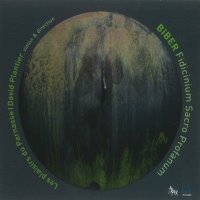 Les Plaisirs du Parnasse / David Plantier, violon & dir.
Les Plaisirs du Parnasse / David Plantier, violon & dir.Zig-Zag Territoires ZZT080701 (71 min 49 s)
**** $$$$
Labels: CDs, français, Heinrich von Biber, product_review
 Les Plaisirs du Parnasse / David Plantier, violon & dir.
Les Plaisirs du Parnasse / David Plantier, violon & dir.Labels: CDs, français, Heinrich von Biber, product_review
 Gürzenich-Orchester Köln / Dimitrji Kitajenko
Gürzenich-Orchester Köln / Dimitrji KitajenkoLabels: CDs, english, product_review, prokofiev, symphonies
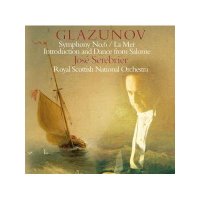 Royal Scottish National Orchestra / José Serebrier
Royal Scottish National Orchestra / José SerebrierLabels: Alexander Glazunov, CDs, english, product_review
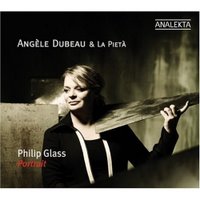 Angèle Dubeau & La Pietà
Angèle Dubeau & La PietàLabels: Angèle Dubeau, CDs, français, Glass, product_review
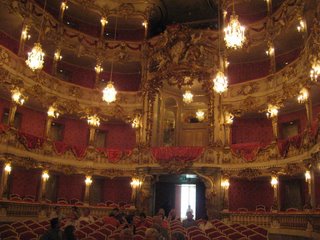 Interior of the Cuvillies Theater
Interior of the Cuvillies TheaterLabels: Bavarian State Opera, Cuvillies Theater
Labels: birthdays, cello, Mischa Maisky, Sherrill Milnes, singer
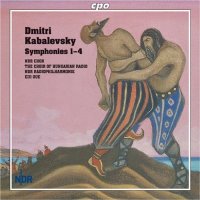 NDR Chor; The Choir of Hungarian Radio; NDR Philharmonie / Eiji Oue
NDR Chor; The Choir of Hungarian Radio; NDR Philharmonie / Eiji OueLabels: CDs, english, kabalevsky, product_review
 Dimitri Maslennikov, cello; NDR Sinfonieorchester / Christoph Eschenbach
Dimitri Maslennikov, cello; NDR Sinfonieorchester / Christoph Eschenbach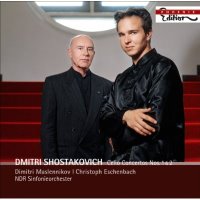 certos of the past 100 years. They both came late in his career – 1959 and 1966 respectively – and the one grew out of the other. Both are anguished and brooding, except when they lurch forward into a kind of danse macabre. This is music that was inspired by cruelty and ugliness in the Soviet Union and one is left with very dark thoughts indeed after hearing either of these pieces.
certos of the past 100 years. They both came late in his career – 1959 and 1966 respectively – and the one grew out of the other. Both are anguished and brooding, except when they lurch forward into a kind of danse macabre. This is music that was inspired by cruelty and ugliness in the Soviet Union and one is left with very dark thoughts indeed after hearing either of these pieces.Labels: CDs, cello, Dmitri Shostakovich, product_review

Labels: classical music, Jules Massenet, Met in HD, Renée Fleming, Thaïs, Thomas Hampson
Labels: birthdays, opera impresario, Rudolf Bing, singer, Waltraud Meier
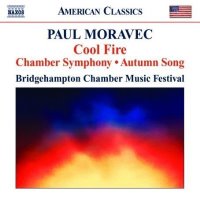 Bridgehampton Chamber Music Festival
Bridgehampton Chamber Music FestivalLabels: CDs, français, moravec, product_review
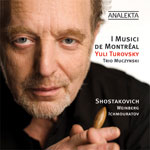 Trio Muczynski (Airat Ichmouratov, clarinette; Luo Di, violoncelle; Evgenia Kirjner, piano); I Musici de Montréal / Yuli Turovsky
Trio Muczynski (Airat Ichmouratov, clarinette; Luo Di, violoncelle; Evgenia Kirjner, piano); I Musici de Montréal / Yuli TurovskyLabels: CDs, français, I Musici de Montréal, product_review, shostakovich
Labels: birthdays, Giorgio Tozzi, piano, singer, Vladimir Feltsman
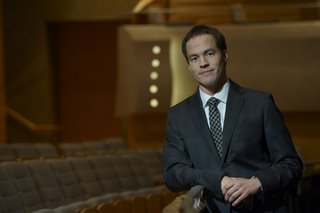
Labels: 2009-10 season, Alexander Neef, COC, Johannes Debus
Labels: birthdays, composer, flute, Francis Poulenc, Jean-Pierre Rampal
Review by Paul E. Robinson
Pianist Arthur Loesser (1894-1969) made few recordings for the world to remember him by; happily, one of his most important has recently been brought back to life by Jacob Harnoy of the Canadian record company, DOREMI.
J.S. Bach’s Well-Tempered Clavier is one of those monumental works worshipped by all musicians as something akin to 'holy writ.' The forty-eight 'Preludes and Fugues' are endlessly fascinating as compositions, and as challenges for aspiring performers. Only a master musician with both technique and maturity, however, can do them justice. On the other hand, this is not audience-grabbing music; the entire “48” are rarely programmed for live concert performance. Record companies have not been enthusiastic either.
Arthur Loesser spent a lifetime studying and playing the “48” and when no record company asked him to preserve his performance for future generations, he did it himself. In 1964, Kenneth Hamann brought his microphones into Loesser’s studio in Cleveland, and just last year Jacob Harnoy restored and remastered that original recording with the help of Jack Silver and Clive Allen. The result is a 3-CD set for posterity (DHR-7893-5).
Loesser was 70 years old when he made this recording, but age is a factor only in a positive way. His technique was equal to whatever the music required, and he chose some very fast tempos indeed.
Loesser is never dazzling in a way that Glenn Gould could be dazzling in his inimitable detaché style of playing baroque music; neither is he ponderous, as German pianists and others can often be in this music. In Loesser’s hands, the music is pretty much what it looks like on the page – what the composer intended, in one sense – but always alive and fresh in its phrasing.
Loesser wrote extensively about the “48”, and his insightful notes are included with the CDs. From the notes, it is clear that Loesser thought deeply about the type of keyboard Bach had in mind for this music, and shaped his performances accordingly. He concludes that Bach certainly did not have the piano in mind for this music, but that with understanding and restraint, the performer can use the piano to do justice to the music. There are, for example, several places where Bach has written a note to be held for so long that its sound entirely dies out. Loesser allows himself the liberty of repeating this note to clarify the harmony. I wish he had done it more often - say, in the concluding bars of the fugue in BWV 846.
An added feature of this new CD set is an appreciation of Loesser by former pupil Anton Kuerti, himself an internationally renowned artist. When the consummate history of music performance in Canada comes to be written, Kuerti's name will, no doubt, figure prominently. He is one of the few Canadian pianists to have achieved international stature and maintained it for many decades. He is himself a teacher whose pupils rank among the foremost pianists of their generation.
Loesser, Kuerti recalls, was “the best (teacher) I have had”... “there was a palpable joy in him as he played, and an uncanny instinct for how to make the dance rhythms infect and delight the listener.”
The all-but-forgotten Arthur Loesser, a fixture at the Cleveland Institute of Music in his day, was not only a fine musician and teacher, but an author as well. His classic text - Men, Women and Pianos: a Social History (Simon and Schuster: New York, 1954. Reprinted by Dover in 1990) - recounts the evolution of the piano, its glory days of the late nineteenth and early Twentieth Centuries, and then ends on a note of sadness, as Loesser documents how the rise of the phonograph and radio undermined music-making in the home and how the emancipation of women meant that feminine accomplishments of previous generations, such as playing the piano “now began to turn stale and trivial” (p.606). “Skepticism of the piano," he notes, "went with skepticism of the way of life that had nurtured it” (p. 608).
As Loesser tells the story, the 'Age of the Piano' was all but over. He was on to something, especially with his observations on how the rise of the piano as a popular instrument was closely connected to the ebb and flow of history and cultures. He may, however, have been somewhat premature with his gloomy conclusion concerning the imminent demise of the piano.
Why, he wondered, had “the 'electronic piano' never caught on” (p. 613). He was writing in 1954, and one could say that it had indeed ‘caught on' - in the form of the 'synthesizer'. Keyboards of all kinds are, after all, uniquely suited to express musical ideas. The piano is no less a ‘period instrument’ than any other, and it probably has one or two permutations yet to go.
Paul E. Robinson is the author of Herbert von Karajan: the Maestro as Superstar and Sir Georg Solti: his Life and Music, both available at http://www.amazon.com.
Labels: Anton Kuerti, Arthur Loesser, Doremi, J.S. Bach, pianist
Labels: Alfred Brendel, birthdays, piano
Labels: birthdays, Grace Bumbry, singer